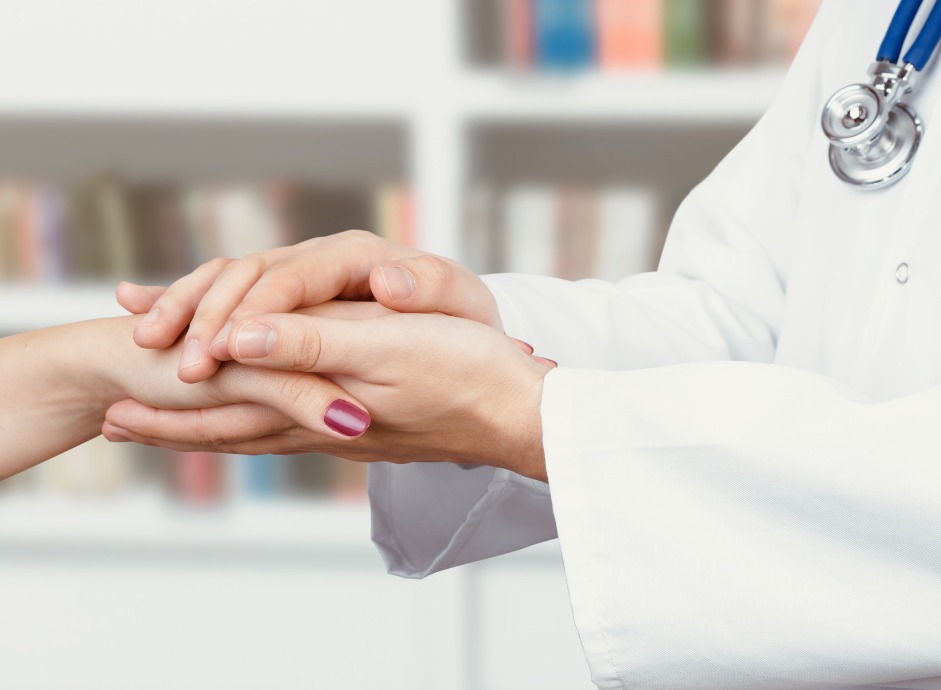PCOS: "It is essential not to get discouraged and to stay positive."
Published 1 Sep 2024 • By Candice Salomé
Raïssa was diagnosed with polycystic ovary syndrome (PCOS) at the age of 13, after her mother noticed similarities to her own experiences with the condition. Unfortunately, Raïssa didn't receive the necessary information or support from doctors at the time.
As her symptoms persisted, she began to question her condition, conducted her own research, and fought to find a healthcare professional knowledgeable about PCOS—someone who listened and helped her on her journey to better health.
Today, Raïssa offers plenty of resources to her community, using her knowledge of PCOS to support and guide many women living with the condition.
Discover her story below!

Hello Raïssa, thank you for agreeing to share your story with Carenity.
First of all, could you tell us a bit more about yourself?
My name is Raïssa, I'm 28 years old, and I'm married. Although I don't have children yet, it's a project that is very dear to my heart and an important consideration in my life.
Professionally, I work as a Digital Project Manager in the luxury sector, a field that excites me not only for its demands and innovation but also for the creativity it allows me to explore.
Outside of work, I enjoy discovering new digital trends, traveling, and spending quality time with my loved ones. I'm also very active on social media, where I share my daily life and experiences, particularly around polycystic ovary syndrome (PCOS), a condition I've been living with since my teenage years.

Can you tell us more about your condition, PCOS? At what age did you first notice symptoms, and what were they?
I was diagnosed with PCOS in 2010, when I was just 13 years old. The first signs that caught my mother's attention were irregular menstrual cycles. At that age, I didn't really understand what that meant, but my mother, who had also suffered from PCOS, quickly recognized the signs and took me to see a gynecologist. That's when everything began.
The diagnosis was made during my first pelvic ultrasound, which, in hindsight, was fortunate because many women wait years to find out what they're suffering from. However, at the time, the doctor didn’t take the time to explain in detail what PCOS was. I remember him simply telling me that I had polycystic ovaries and that I should consider having children early, a confusing piece of advice for a 13-year-old. At that moment, the implications of the diagnosis were not clear to me, and it wasn't until much later, seeing the impact of this condition on my mother and other women in my family, that I began to understand the challenges I would face.
The diagnosis of PCOS can often take a long time. How long did it take in your case? How many doctors did you see? Did you receive all the information necessary to understand this condition? Did you do your own research? If so, how?
In my case, the diagnosis was made very quickly. During my first appointment, a pelvic ultrasound was enough for the doctor to identify PCOS. However, even though the diagnosis was quick, I faced a significant lack of information. The doctor just informed me of my condition without really explaining what it meant in the long term.
At that age, I didn't seek more information, thinking it wasn't serious. It was only as I grew older and saw the effects of PCOS on my health and that of other women in my family that I began to question it more deeply. I had to do my own research to fully understand what PCOS was. Online information helped me, but it was mainly through discussions with other women and reading specialized materials that I was able to better grasp this condition. It's unfortunate that so many women are left to fend for themselves after such an important diagnosis, without adequate support to understand and manage their illness.
What is your current treatment plan? Are you satisfied with it?
Currently, I'm being treated by an endocrinologist specialized in PCOS, and I'm quite satisfied with this care. My endocrinologist takes a holistic approach to my health, which is essential for a condition as complex as PCOS.
He helps me manage not only the hormonal aspects but also the side effects related to the condition, such as weight gain, fatigue management, and skin issues. This regular follow-up allows me to better understand the fluctuations in my body and adjust my lifestyle accordingly. I feel heard and supported, which is crucial when living with a chronic condition. However, I'm aware that not all women have the same experience and that many struggle to find a healthcare professional who truly understands them.
What impact has PCOS had on your personal and professional life?
PCOS has had a significant impact on my life, both personally and professionally. In my personal life, this condition affects almost every aspect of my daily life: my moods are sometimes unpredictable, I struggle with difficult-to-control weight gain, my libido is affected, and I suffer from chronic fatigue.
This constant fatigue is one of the most challenging aspects to manage, as it greatly limits my social activities. I remember times when I had no energy to go out, which sometimes caused tension with my loved ones. Hair loss and hirsutism were also very hard to deal with. Having facial hair at an age when you're beginning to form your self-image is extremely destabilizing.
Professionally, PCOS has often held me back.
Attending after-work events or social gatherings with colleagues was a real challenge. I avoided these situations as much as possible, not only because of the fatigue but also out of fear that my symptoms would be too visible. I often preferred to isolate myself rather than risk comments or disapproving looks. That said, I've learned to accept my condition and talk about it openly, which has helped me regain some peace of mind at work.
Now, you talk about PCOS on social media. Why did you make this choice? What do you share? What feedback do you get from your community?
I decided to talk about PCOS on social media (under the handle @raissadora on Instagram) because I realized there was a lack of visibility and information about this condition. PCOS is an invisible illness that, nonetheless, deeply affects the lives of many women. I felt the need to break the silence and share my experience to help other women not feel alone in this struggle.
On my platforms, I share my daily life with PCOS, my dietary routines, tips I've discovered for combating hair loss, and, most importantly, my journey toward motherhood in my native language, French.
The feedback I receive is extremely positive. Many women identify with my symptoms and thank me for giving them a voice. Some have even told me that they were able to get a diagnosis thanks to my videos. It's incredibly rewarding to know that my testimony has made a difference in someone's life. This motivates me to continue informing and raising awareness because I know how difficult it is to live with PCOS without the necessary support and information.
Being active on social platforms, you must regularly receive messages from women affected by PCOS. What are the most common concerns? What needs to be highlighted to advance the understanding of this condition?
The messages I receive from women with PCOS are often similar: many talk about infertility, medical uncertainty, and the lack of empathy from healthcare professionals. One of the most common complaints is the difficulty in obtaining a clear and comprehensive diagnosis.
Too often, women face doctors who minimize their symptoms or don't take the time to listen to them.
They're simply told to take birth control pills or lose weight, without any explanation about the other aspects of the condition.
This lack of empathy is devastating because it leaves patients feeling ignored and misunderstood. I believe it's crucial to call out this attitude and advocate for better training of healthcare professionals on PCOS. Women need doctors who listen, support, and help them find solutions tailored to their particular situation. It's also important to raise public awareness so that PCOS is better understood and women who suffer from it don't feel alone or marginalized.
Do you have any advice (or lifestyle changes) for women with PCOS to better manage the condition and its symptoms? What are they?
I firmly believe that diet is one of the most powerful tools for living better with PCOS. A balanced diet, rich in fiber, proteins, and low in carbohydrates, can have a significant impact on PCOS symptoms. For example, some studies show that reducing sugar and refined carbohydrates can help stabilize insulin levels, which is often a problem for women with PCOS. Personally, I've found that small adjustments, such as incorporating more vegetables, fresh fruits, whole grains, and lean proteins into my diet, have made a big difference.
In parallel, controlling a sedentary lifestyle is crucial. Lack of physical activity can worsen PCOS symptoms, particularly by contributing to weight gain and worsening insulin resistance. I encourage women to move as much as possible, even if it just means walking for 30 minutes a day. Regular physical activity not only helps with weight management, but it also improves mood, reduces stress, and promotes overall better health.
I also recommend paying attention to endocrine disruptors, which often lurk in our beauty products, household cleaners, and even some foods. These chemicals can interfere with our hormones and potentially worsen PCOS symptoms. Sorting through your cabinets and choosing more natural products can help limit this exposure.
Finally, it's essential not to overlook the psychological aspect.
Living with PCOS can be emotionally challenging. Therefore, it's important to find ways to manage stress, whether through meditation, yoga, or simply taking time for yourself. Don't underestimate the importance of your mental well-being, as it's closely linked to your physical well-being.
What do you think social media, health forums, and podcasts contribute to patients in managing the disease? Is it important, in your opinion, to be informed about your condition? If so, why?
Social media, forums, and blogs play an absolutely vital role for women with PCOS. These platforms offer a space where women can share their experiences, find support, and access information that isn't always available from healthcare professionals. For many, discovering that they are not alone in this battle is a true relief.
This allows for the creation of a community where one feels understood and supported, which is particularly important when living with an invisible illness like PCOS. The diverse content available on these platforms allows each person to find advice tailored to their personal situation. It's crucial to understand that there are as many forms of PCOS as there are women who suffer from it, and that's where the richness of these online communities lies. Women can draw ideas from them to adjust their diet, discover specific supplements, or learn how to better manage their symptoms on a daily basis. For my part, after 12 years of medication, I decided to turn to a more natural approach, with dietary supplements. This transition was facilitated by the wealth of information I found online, particularly on plants and supplements that can help regulate PCOS symptoms. Being informed and understanding your condition is crucial because it allows you to make informed decisions about your own body. Having control over your treatment and knowing what works for you is a form of empowerment that is invaluable.
What are your plans for the future?
For the future, I have several projects that are close to my heart, both personally and professionally.
First, I'm currently working on rewriting a new version of my book on PCOS, which I initially published in 2018. In six years, there have been so many new research findings and advancements on the subject that I feel the need to share this information with my community, especially since my approach to the condition has also evolved.
At the same time, I want to continue raising awareness and informing about PCOS through conferences, workshops, and, of course, via my online platforms. It's a mission that I'm passionate about because I know how important it is to give visibility to this disease and to support the women who suffer from it. An especially exciting project that I've been working on for a year is the development of my first dietary supplement in collaboration with a French laboratory.
This product is specifically designed to help women with PCOS, targeting stress, menstrual pain, and high prolactin levels. My goal is to offer a natural and effective alternative, highlighting the benefits of plants to improve the quality of life for women. I firmly believe that nature has much to offer and that natural solutions can complement, or even replace, conventional treatments in some cases.
Finally, on a personal level, I continue to reflect on my motherhood project, which remains a priority in my life. It's a journey that can be fraught with obstacles for women with PCOS, but I am determined to see it through, and I want to share this experience to support other women going through the same ordeal.
Any final words?
Polycystic ovary syndrome is not a life sentence. Just because you have PCOS doesn't mean you can't have children or lead a fulfilling life. Of course, the journey can be difficult and full of challenges, but it's important to remember that there are solutions to manage the symptoms, and that every woman is different. Some women with PCOS are even hyper-fertile, while others have managed to reverse their symptoms through lifestyle changes, a proper diet, and good medical and psychological support.
It's essential not to get discouraged and to stay positive. I want to show that there is a positive side to living with PCOS. This condition can make us stronger, more resilient, and more aware of our bodies and our health. It's also crucial to be wary of those who offer miracle cures, like teas or potions that claim to cure PCOS. The truth is that PCOS cannot be cured but can be managed. So, take the time to understand your own body, try different approaches, and above all, never give up. Stay informed, listen to your body, and trust yourself.
The most important thing is not to let this condition define you. You have the power to decide how you want to manage your PCOS, and with the right information and support, you can live a full and fulfilling life.
Thank you, Carenity!
A big thank you to Raïssa for this interview!
Did you find this interview helpful?
Give it a “Like” and share your thoughts and questions with the community in the comments below!
Take care of yourself!

 Facebook
Facebook Twitter
Twitter


